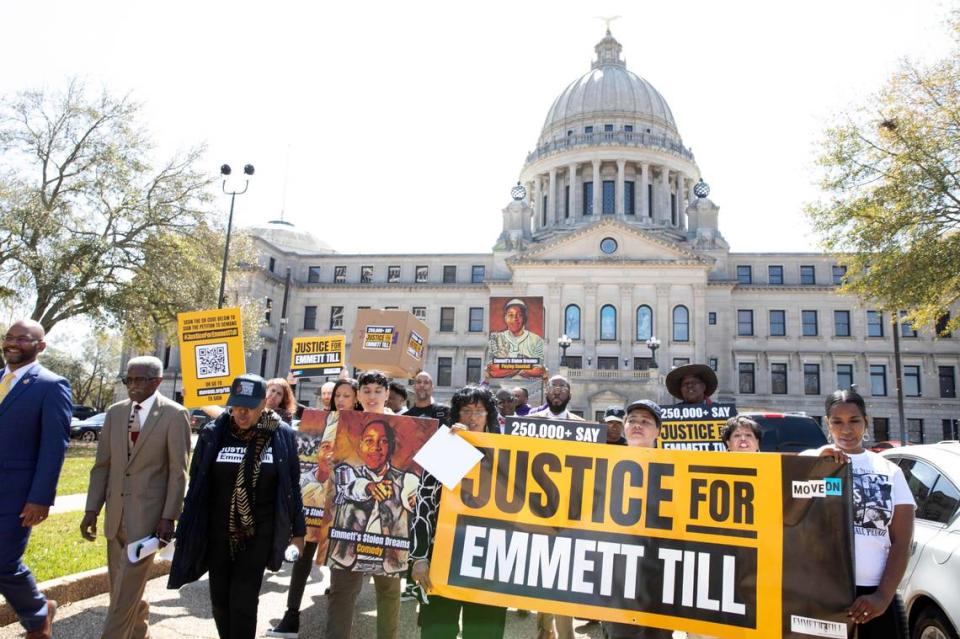Woman’s claims led to Emmett Till’s lynching. What historian says her death should mean
- Oops!Something went wrong.Please try again later.
North Carolina historian Tim Tyson was one of the few people to ever interview Carolyn Bryant Donham about the encounter that led to the lynching of Emmett Till 68 years ago.
His 2017 book, “The Blood of Emmett Till,” revealed Donham’s stunning statement that she had lied about the circumstances of what happened between her and Till in 1955 — details that set off a chain of events ending with his murder.
Donham died Thursday in Louisiana at the age of 88. She lived part of her life in Raleigh.
The day after her death, Tyson said people should not focus on Donham’s death, which has stirred strong and mixed emotions. Instead, her death should be a reminder of what Till’s mother, Mamie, wanted for America.
“Which is focusing on taking racial tragedies and turning this into a society more like the one that we envision for ourselves — a multiracial democracy,” said Tyson, a Duke University professor and historian, in a phone interview with The News & Observer on Friday.
“That’s what she fought for,” Tyson said. “That’s what she wanted her son’s life to mean.”

After the news of her death was announced, some said it marked the end of a painful chapter for Till’s family. But others says it doesn’t equate to justice and that the fight after Till’s death should continue.
Tyson said he learned of Donham’s death late Thursday, prompting reflections about his interviews with her.
“Those conversations are never what you would imagine,” Tyson told The N&O. “She was involved in something despicable and I, too, wish that justice had been served somehow in this case.”
Who was Emmett Till? What we all need to know about his death and legacy
What happened to Emmett Till?
Till had just turned 14 when he was tortured, mutilated and shot in August 1955.
Donham, who was white, was married to one of Till’s assailants, Roy Bryant. She accused Till of whistling at her and grabbing her in a grocery store in Money, Mississippi. Bryant, his brother John Milton, and a lynch mob drove to Till’s uncle’s home to kidnap the boy in the middle of the night.
Till’s body was found in the Tallahatchie River tied to a cotton gin fan. A month later, an all-white jury acquitted Bryant and Milton of murder.
According to Tyson’s book, Donham told him that she had lied about what happened that day.
“The men who murdered Emmett Till were alive for years and years and could have been prosecuted,” Tyson said. “Not just the two who were tried, but several more that participated in the lynching were never tried.”
But last year, Donham’s unpublished memoir, which Tyson had obtained, fueled further questions when she introduced contradictory statements about the events from 1955. She said she had not identified Till to her husband and didn’t know what would happen to the young boy, according to The Associated Press.
“I think it’s easier to condemn Carolyn than it is to confront what our society was and is,” Tyson said. “We’re still killing Emmett Till in so many ways.”
Till’s mother dedicated the remainder of her life to seeking justice for her only child.
Her decision to have an open casket funeral for Till sparked international outrage that led to the early start of the Civil Rights Movement.
Till’s death is still evoked today when an African American is killed at the hands of a white police officer, such as George Floyd, or when Black people are killed in racist incidents, like Ahmaud Arbery, a jogger who was killed by white men in Georgia.

‘How to get there from here’
A year ago, Till’s family and civil rights activists were on a mission to find Donham, who was last known to live in Wake County, to serve a recently surfaced unserved arrest warrant that was issued shortly after Till’s death. A search team found the warrant in a file folder at the Leflore County Circuit courthouse, the same Mississippi county where Till was killed.
Some took to social media on Thursday to remember Till and his family’s fight for justice. One of Till’s cousins, Joshua Harris-Till, said in a TikTok video that his family is “still trying to make this country atone for what it did wrong.”
“We’re still trying to make this country actually care about Black and brown lives and Black and brown bodies,” he said.
To achieve a more just country, Tyson said there needs to be a different approach, including the reformation of the criminal justice system.
“Beginning with thinking about what kind of country we’d like our children and grandchildren to grow up in and thinking hard about how to get there from here,” Tyson said. “And focusing on the cultivation of human capacities in young people that we need to do in a far more deliberate and resourceful way.”
Earlier this week, on April 24, local activists came to downtown Raleigh to celebrate the 10th anniversary of the Moral Monday campaign. One of the campaign’s leaders, the Rev. William J. Barber reignited the crowd with a mission to continue the mission for equity.
Tyson said the campaign was a good start to building a stronger multi-racial coalition, better strategies for protests, litigation and voting.
“We’ve got to fight the rise of authoritarianism and these racially-fueled backlash politics,” Tyson said. “We don’t have to submit to that. ... Despair is a luxury we can’t afford.”
With Emmett Till murder back in the news, these books and documentaries are essential

